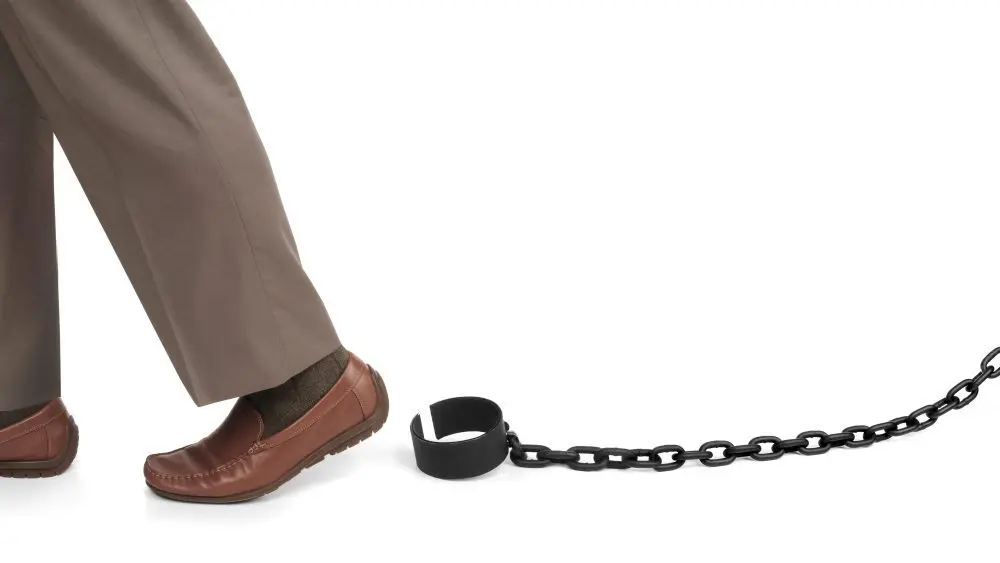
The road from jailhouse door to a successful life outside can be a bumpy one. With just $200 in pocket on release from detention and without meaningful support or a way to earn an income, the hurdles can seem insurmountable for the recently incarcerated. For those ready to make the most of a second chance, however, the Center for Employment Opportunities (CEO), a national nonprofit with a North Bay location in San Rafael, aims to increase the odds of success by providing transitional employment and training to help participants build productive lives.
CEO was founded in the 1970s as a project of the Vera Institute for Justice, a New York-based think tank seeking solutions to mass incarceration (it became a 501(c)3 nonprofit in 1996). The center provides immediate employment and training in soft skills for people starting over after they’ve spent time in the criminal justice system, and is now located in 30 cities across 12 states.
The San Rafael office opened in 2019. “We go to where the need is,” says Marin director Schenelle Andrews, explaining that CEO responds to requests for services, and determined that Marin County had a population that could benefit. “We are one of the few offices that can service multiple counties,” she says, and individuals returning to Marin, Sonoma, San Francisco and Contra Costa counties can avail themselves of CEO Marin’s services. It served 180 individuals during the last fiscal year, which ended on June 30, and in previous years, as many as 200 people went through the program. CEO has two criteria for admission: the justice system has to be involved, and individuals must have been recently released from jail or prison. Parole and probation departments make referrals, and nonprofits such as Ritter Center, Homeward Bound of Marin and Center Point, Inc. refer individuals as well. “Also, word of mouth is really big,” says Andrews.
“Without support, they risk returning to prison or jail,” explains Tiffany Elder, CEO’s regional communication manager. She reports that each year, 35,000 to 40,000 people are released from California prisons, and nearly half return within three years if they don’t have adequate support. “CEO is changing that trajectory one job at a time,” she says.
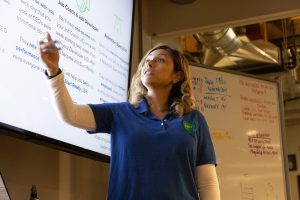
Participants start with a three-day paid orientation, which includes onboarding with hiring documentation and safety training, as well as California’s mandated harassment training. Then they spend two to four months working on one of two crews doing litter abatement for Caltrans alongside highways three days a week. On a fourth day, they receive training to help them find full-time, permanent employment. Caltrans contracts CEO Marin, which acts as the employer, managing crews and paying them at the end of every shift so they can meet essential daily needs. “It’s a struggle for most of our people to have those basic necessities,” says Andrews, and receiving compensation right away helps with the cost of food, housing and healthcare.
On their days at CEO, those in the program learn about topics such as financial literacy, work-life balance, making good choices and ways to address the barriers they might encounter. They also learn to create résumés and take part in mock interviews so they’ll be ready to seek permanent work when the transition period ends. In addition, opportunities are available for individuals who want to follow a particular pathway and need outside education. “We would pay for that training and help them get employment,” says Elder, and the center provides a stipend and releases individuals from crew work so they can focus solely on advanced training.
The road to success
Sonoma County resident Steve Molina, 54, had been in and out of prison since 1994 and homeless since 2005—but after his last release, he was ready to make a change. “When I came home from prison, I knew what I wanted to do. I wanted to come home and be successful,” he says. He was on parole, and he went to a meeting where he learned about CEO, and a representative handed him a card. He attended an orientation and joined one of the crews picking up trash this past March.
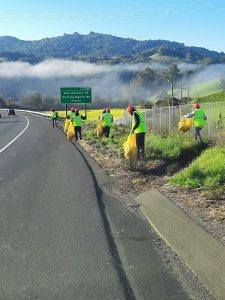
Molina’s long-range plan was to get his commercial driver’s license, and CEO supported him in his efforts to attain that goal. He started work on his CDL online and continued attending weekly workshops where participants talked about what was going on in their lives; they also had the use of computers to help them write résumés and cover letters. ”They help you do everything you need to succeed, and I took advantage of everything they had to offer,” he says. Next he attended Moga Truck Driving School in Petaluma, and “the day I graduated I applied for the job I have now,” he says. “Everything is going forward and positive,” he reports. He drives for a trucking company, and has his own apartment, car and bank account. Molina advises those fortunate enough to get a similar opportunity to apply themselves, be productive and stay healthy. “It’s changed my life completely,” he says.
Moving forward
Although the Center for Employment Opportunities helps most people find full-time, unsupported employment when the transition period ends, it retains some with paid internships in its Emerging Leaders Program. Interns support office staff, assist site supervisors on roadside crews or work in a variety of areas such as information technology, human resources, administration or job coaching for a duration of 12 weeks. They’re also paired with a mentor and receive training in professional development. Following their tenure as interns, most find good positions with outside businesses and organizations, and some stay at CEO as permanent employees.
Marin resident Seena Aguilar, 43, is a job coach and retention specialist at CEO. She entered the transitional work program in April 2023, after a previous participant recommended it to her. Poor decisions and struggles with addiction had upended her life, and CEO gave her the opportunity to grow and get out of her comfort zone so she could start over. Being on a crew helped, because she received direct feedback on her performance and a lot of encouragement. “The site supervisor played a major part in where I’m at today,” she says. The weekly training was also valuable. “The workshop that really sticks out to me [focused on] dealing with rejection, because we do get a lot of nos,” she says. She was rejected the first time she applied for the Emerging Leaders Program, but she continued working on a crew and credits her site supervisor with playing a big part in keeping her motivated. When another opportunity came up, she reapplied and this time was accepted. She explains that CEO internships are sought after and competitive, and the center needs to know that applicants will take those positions seriously. “It’s a really great opportunity; it’s not an opportunity that’s taken lightly,” she says.
She had office training and is now a permanent employee who helps other people find ways to overcome obstacles. Among them are obtaining clothing for interviews, directing them to places where they can get housing and, if necessary, accessing mental health services. “I consider myself peer support,” she says, and she assists people with basic résumés and arranges mock interviews. In addition, she stays in contact for a year with people who need continued support. At CEO, she believes she’s found her purpose. She used to be a waitress and thought that was her destiny, but CEO allowed her to follow another path. “Being a permanent employee of CEO is one of my biggest life accomplishments. I feel I am worthy and valuable, and I’m very passionate about sharing my story to encourage and inspire others who struggled like I did,” she says.
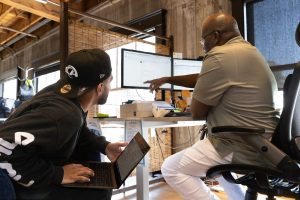
P2E (Pathway to Employment) instructor and outreach specialist Lia Watts, 40, is a Marin resident who began transitional employment in July 2023. “I was referred through some of the support groups I was part of,” she says, and it gave her a chance to get back into the workforce after dealing with personal hurdles. “In my 20s, I laid the groundwork to be a successful person … but I got drastically off course,” she says, explaining that she made a series of bad decisions that led to her incarceration. She was feeling discouraged and didn’t know how to get back on track, so when CEO came into her life, “It was a blessing,” she says. “It was a huge wakeup call. It was a pivoting point in my life.”
She enjoyed working on crew, where she got exercise and spent time outdoors, and she liked knowing what tasks she was expected to do. “The site supervisors gave me really great guidance,” she says, and getting recognition and feedback helped her regain her confidence and become reacquainted with herself as a hard worker. In the workshops, she picked up cognitive behavior tips, identified her values and priorities and learned to recognize risky behavior. When the opportunity came, she filled out an application for the Emerging Leaders Program and went through the interview process. “[But] I didn’t get it the first time. I wasn’t there yet; I didn’t have the skills,” she recalls. She was accepted on her second attempt. “Finding out I got the opportunity was the best feeling. It opened so many doors and avenues of learning,” she says. “It felt like bootcamp for being a great employee and part of a team.”
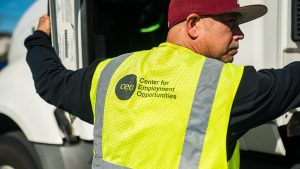
Today, her responsibilities include speaking to people before they start the program to make sure they have the proper documentation and know what to expect, helping to lead the three-day orientation and guiding participants through filling out paperwork. She also runs workshops in topics such as professionalism in the workplace and how to make a budget. “CEO gives people the opportunity to set goals and then be able to attain them in a way that really builds goal-setting behavior and makes an impact on someone’s life,” she says.
Seeing others learn, grow and become successful, and being part of their journey is heartwarming for those who are now giving back. “I’m a strong believer in second chances,” says Aguilar. And she and her peers know firsthand how meaningful they can be.
